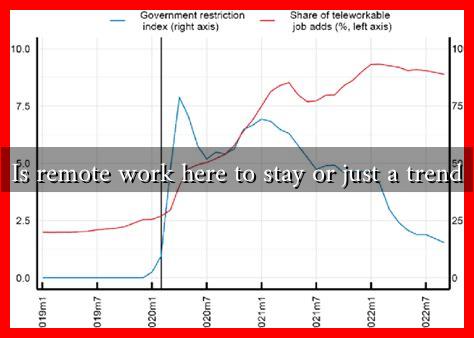-
Table of Contents
Is Remote Work Here to Stay or Just a Trend?
The COVID-19 pandemic has dramatically reshaped the landscape of work, thrusting remote work into the spotlight. As companies adapted to lockdowns and social distancing measures, many employees transitioned to working from home. Now, as the world begins to return to normalcy, a pressing question arises: Is remote work here to stay, or is it merely a passing trend? This article explores the factors influencing the future of remote work, its benefits and challenges, and what the data suggests about its longevity.
The Rise of Remote Work
Before the pandemic, remote work was already gaining traction, but the shift was accelerated by necessity. According to a report by Stanford University, remote work increased from 24% of the workforce in 2019 to 42% in 2020. This sudden shift forced companies to adopt new technologies and rethink their operational strategies.
Benefits of Remote Work
Remote work offers numerous advantages for both employees and employers, which may contribute to its staying power:
- Increased Flexibility: Employees can create their own schedules, leading to improved work-life balance.
- Cost Savings: Companies can save on overhead costs such as office space and utilities.
- Access to a Global Talent Pool: Employers can hire talent from anywhere, not limited by geographical constraints.
- Higher Productivity: Many studies, including one from Airtasker, found that remote workers often report higher productivity levels compared to their in-office counterparts.
Challenges of Remote Work
Despite its benefits, remote work is not without challenges. Some of these include:
- Communication Barriers: Remote work can lead to misunderstandings and a lack of collaboration.
- Isolation: Employees may feel disconnected from their teams, leading to decreased morale.
- Work-Life Boundaries: The blurring of lines between work and personal life can lead to burnout.
- Technology Dependence: Remote work relies heavily on technology, which can be a barrier for some employees.
Case Studies: Companies Embracing Remote Work
Several companies have embraced remote work as a long-term strategy, setting a precedent for others to follow:
- Twitter: The social media giant announced that employees could work from home indefinitely if they choose.
- Shopify: The e-commerce platform declared itself a “digital by default” company, allowing employees to work remotely permanently.
- Microsoft: The tech giant has introduced a hybrid work model, allowing employees to choose their work environment.
Statistics Supporting Remote Work’s Longevity
Data from various studies indicates that remote work is likely to remain a significant part of the employment landscape:
- A survey by McKinsey found that 52% of employees prefer a hybrid work model, combining remote and in-office work.
- According to Buffer’s “State of Remote Work” report, 97% of remote workers would recommend remote work to others.
- The Global Workplace Analytics report predicts that by 2025, 70% of the workforce will be working remotely at least five days a month.
The Future of Remote Work
As we look ahead, it is clear that remote work is not just a trend but a fundamental shift in how we approach work. Companies are increasingly recognizing the benefits of flexible work arrangements, and employees are demanding more autonomy over their work environments. However, the future will likely involve a hybrid model that combines the best of both worlds—remote and in-office work.
Conclusion
In conclusion, remote work is here to stay, driven by its numerous benefits and the changing expectations of the workforce. While challenges remain, companies that adapt to this new reality will likely find themselves more competitive in attracting and retaining talent. As we move forward, embracing flexibility and innovation will be key to navigating the evolving landscape of work. For more insights on remote work trends, you can visit Forbes.


